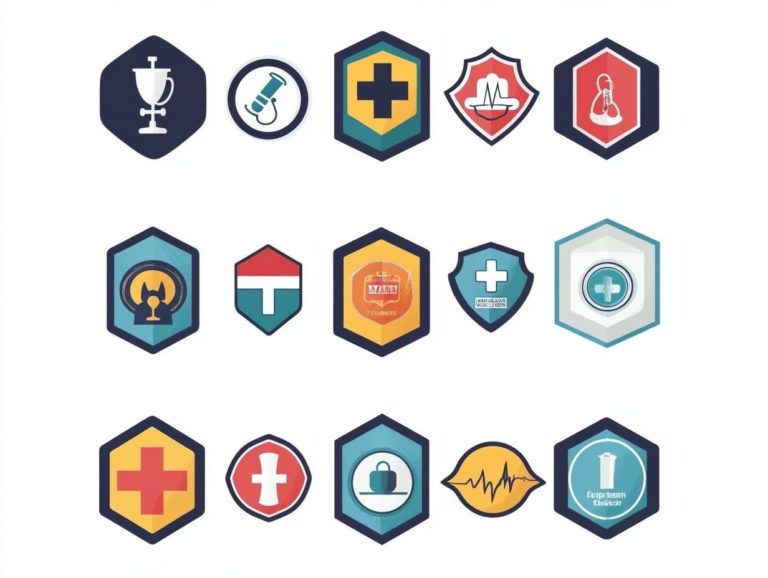The Value of Certification in Healthcare Management
Certification in healthcare management transcends mere credentials; it embodies your dedication to excellence and professionalism in a dynamic and ever-evolving field.
This article delves into the myriad benefits certification offers both professionals like you and the organizations you represent. It highlights the various types of certifications available and outlines the essential requirements for obtaining them.
You’ll find practical tips for exam preparation alongside insights into the importance of maintaining your certification through ongoing education.
Furthermore, a comparison of different certification programs will be provided, equipping you with the knowledge needed to make informed decisions for your career advancement.
Contents
Key Takeaways:

- Achieving certification in healthcare management offers numerous benefits for both professionals and organizations, including increased job opportunities, salary potential, and credibility.
- There are various types of certifications available, each with its own unique requirements and focus areas. Researching the right fit for your career goals is essential.
- To obtain certification, individuals must meet specific educational and experience requirements that may vary depending on the program. Planning and preparation are crucial.
The Importance of Certification in Healthcare Management
A certification in healthcare management is more than just a credential; it signifies your commitment to excellence and highlights why healthcare professionals should pursue certification within the intricate healthcare industry.
As the demand for skilled healthcare executives rises, acquiring relevant certifications becomes essential for anyone looking to elevate their career.
Organizations gain a competitive edge by ensuring their leaders are well-versed in best practices for patient care and healthcare compliance, especially with the changing standards set by influential bodies like the American College of Healthcare Executives.
Benefits for Professionals and Organizations
Getting certified isn t just a personal win; it s a game-changer for your career! These credentials add substantial value to both you and the organizations you represent.
These credentials enhance your job security in a competitive landscape, positioning you for greater career advancement opportunities. In fact, certified professionals enjoy a remarkable 25% higher chance of promotion compared to their non-certified colleagues.
This not only elevates your morale but also contributes to improved employee retention rates for healthcare organizations.
Recent studies reveal that organizations prioritizing certification programs see up to a 20% increase in employee satisfaction, which ultimately enhances patient outcomes and drives organizational success.
Testimonials from healthcare leaders underscore that investing in staff development through certifications leads to a more skilled workforce, reinforcing the overall quality of care provided.
Types of Healthcare Management Certifications

Healthcare management offers a range of certifications, including understanding the healthcare risk management certification, tailored to meet the diverse needs of healthcare professionals.
These programs equip you with the essential knowledge and skills required to expertly navigate the intricate landscape of healthcare.
Don t miss out on the opportunity to advance your career! Ready to elevate your career? Start your certification journey today!
Overview of Different Certifications
An exploration of the various healthcare certifications reveals a rich array of officially recognized training programs designed for different specialties within the healthcare sector.
These certifications serve as essential benchmarks for enhancing your expertise and ensuring you meet the dynamic demands of the industry.
For instance, pursuing the Certified Healthcare Financial Professional (CHFP) credential sharpens your financial management skills, which are vital for sustaining operations and optimizing resource allocation.
The Certified Patient Safety Executive (CPSE) certification focuses on improving care quality and safety standards, which are fundamental in preventing medical errors.
The Certified Healthcare Quality Professional (CHQP) highlights the importance of quality improvement in patient care.
Accreditation standards validate the credibility of these certifications and increase their value, assuring employers and stakeholders that you possess the necessary skills to thrive in your role.
Requirements for Obtaining Certification
To obtain certification in healthcare management, you must fulfill specific educational and experiential criteria. These requirements lay the groundwork for your professional excellence and competency in this vital field.
Educational and Experience Requirements

Educational and experience requirements for healthcare certifications can vary significantly, often reflecting the complexity and demands of the roles you will undertake as a healthcare professional.
If you re pursuing a Certified Healthcare Executive (CHE) designation, you’ll typically need a master s degree in healthcare administration or a related field, along with several years of leadership experience in a healthcare setting. This background equips you with essential skills in strategy, operational management, and financial oversight.
Similarly, if you aim for certifications like the Fellow of the American College of Healthcare Executives (FACHE), you ll need to demonstrate extensive professional experience, often exceeding a decade, coupled with a commitment to ongoing professional development.
These prerequisites equip you for the challenges ahead in healthcare management and ensure you have a solid foundation to lead, innovate, and drive effective change within your organization.
Preparing for Certification Exams
Preparing for certification exams in healthcare management is a strategic endeavor that can significantly elevate your chances of success and propel your career forward. Invest time to create a focused study plan it s your ticket to success!
Tips and Strategies for Success
Success in certification exams relies heavily on effective tips and strategies that can enhance your preparation process and boost knowledge retention.
Embrace proven time management techniques like the Pomodoro Technique, which encourages structured study intervals followed by brief breaks to ward off burnout.
Diving into a variety of resources, such as online courses or study groups, can provide fresh perspectives that deepen your understanding.
Engaging in active study methods like summarizing material or teaching concepts to peers further solidifies your grasp of the subject.
Networking with fellow aspirants and joining professional associations can offer vital support and additional resources, creating a collaborative environment that enriches your learning experience and fuels your motivation.
Maintaining Certification and Continuing Education

Maintaining certification and actively pursuing continuing education are essential for a thriving career in healthcare management. By doing so, you ensure that you remain at the forefront of industry trends and standards, positioning yourself as a knowledgeable and competent professional in an ever-evolving field.
Start your certification journey today and advance your career!
Requirements and Benefits of Renewal
The requirements and benefits of certification renewal highlight the critical role of continuous professional development in healthcare.
You may find yourself navigating specific timelines for your renewal process. This typically involves earning courses or training that help you learn new skills. This structured approach keeps you updated on the latest practices and technologies.
It also cultivates a culture of lifelong learning that is essential in today s fast-paced environment. Meeting these requirements boosts your career, opening doors to advancement opportunities while reinforcing your commitment to quality patient care.
Organizations also benefit from certified staff, who contribute to increased effectiveness and improved health outcomes, creating a win-win scenario for everyone involved.
Comparison of Certification Programs
When considering certification programs in healthcare management, it’s crucial to compare options carefully. This process helps you identify the most relevant and beneficial credentials, such as understanding the process of healthcare certification, that can significantly enhance your career prospects.
Key Differences and Considerations
Key differences and considerations play a crucial role in your decision-making process as a healthcare professional contemplating certification. Understanding these elements can profoundly influence your career trajectory and professional development.
The specific focus of a certification often emphasizes particular skills or knowledge areas essential for excelling in diverse healthcare environments. Industry recognition of such certifications can elevate your credibility and unlock new opportunities.
Aligning your certification with your personal career goals ensures you are equipped to meet the demands of your desired role. The implications of these differences are significant, as they directly impact your job security and advancement prospects within the competitive healthcare landscape.
Frequently Asked Questions
- What is the value of certification in healthcare management?
The value of certification in healthcare management lies in its ability to demonstrate a certain level of expertise and knowledge in the field. It signifies a commitment to continuous learning and professional development, leading to better job opportunities and career advancement. - How does certification benefit healthcare management professionals?
Certification increases marketability, expands skills and knowledge, and provides a competitive edge in the job market. It can also lead to higher salaries and more job opportunities. - What are the different types of certifications available in healthcare management?
There are several types of certifications, including:- Certified Healthcare Executive (CHE)
- Certified Professional in Healthcare Quality (CPHQ)
- Certified Professional in Healthcare Information and Management Systems (CPHIMS)
- Certified Healthcare Financial Professional (CHFP)
Each certification has its own set of requirements and focuses on different healthcare management aspects.
- Is certification required to work in healthcare management?
No, certification is not necessarily required. However, it can greatly enhance one’s career and open up more job opportunities. Many employers prefer or require certification for certain positions, especially in larger healthcare organizations. - How do I become certified in healthcare management?
The specific steps may vary depending on the type of certification. Generally, it involves meeting certain education and experience requirements, passing an exam, and maintaining certification through continuing education. Research the specific requirements for the certification you are interested in pursuing. - What are the benefits of hiring certified healthcare management professionals?
Hiring certified professionals brings several benefits. They possess up-to-date knowledge and skills, improving the quality and efficiency of healthcare operations. Certified professionals also have a higher level of credibility and can help meet regulatory and compliance requirements.






